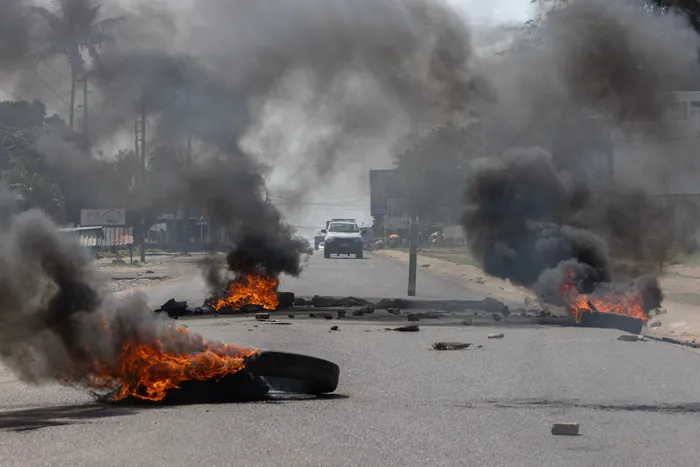Time for SADC leaders to embrace change sweeping across the region

Burning barricades are seen in the road during a protest in the Choupal neighborhood of Maputo on November 15, 2024. Opposition leader Venancio Mondlane is challenging the results of that country’s October 9 elections. Opposition parties have for a long time been criminalized and brutalized in several SADC member states for challenging the sitting governments, says the writer. Picture: Alfredo Zuniga/AFP
Dr. Sizo Nkala
THE Southern African Development Community (SADC) will hold an Extraordinary Summit in Zimbabwe from the 16th to the 20th of November. According to communication from the government of Zimbabwe, the current SADC chair, the summit will discuss the elections in Mozambique and Botswana and the upcoming elections in Namibia.
The summit comes amid the post-election violence in Mozambique which, according to the Centre for Democracy and Human Rights in Mozambique, has claimed 34 lives and left scores of others injured following a heavy-handed response from the country’s security forces. The government has also restricted internet access across the country to slow down the mobilization of protesters.
Violence ensued when opposition supporters took to the streets to express their dissatisfaction with the outcome of the elections in which the ruling party candidate, Daniel Chapo, was announced the winner with almost 71% of the vote by the Mozambique National Election Commission (CNE). His closest challenger, Venancio Mondlane of the Optimist Party for the Development of Mozambique, came a distant second with 20% of the vote.
Chapo’s win will ensure the continued rule of Frelimo which has been in power since independence in 1975. However, Mondlane rejected the results as false and accused the CNE of election rigging on behalf of the ruling party. He called on his supporters to take to the streets to protest the results of the elections which he said do not reflect the will of the people. His statements were corroborated by the European Union Election Observation Mission (EU EOM) which claimed that it “noted irregularities during counting and unjustified alteration of election results at polling station and district level.”
However, the SADC Election Observation Mission (SADC EOM) issued a contrasting preliminary statement which pointed out that “the pre-election and voting phases of the 2024 Presidential, Legislative and Provincial Elections were professionally organised, conducted in an orderly, peaceful and free atmosphere.”
The Extraordinary Summit will discuss the SADC EOM’s final report on the Mozambican elections and map the way forward. However, there is little prospect that the summit will change anything other than rubberstamping the SADC EOM’s report.
The SADC Chair, Zimbabwean President Emmerson Mnangagwa, congratulated Frelimo on its election success even before the CNE announced the results. Moreover, the SADC’s biggest economy and most influential country, South Africa, has already said, through the Minister of International Relations and Cooperation Ronald Lamola, that it will be guided by the SADC and the African Union (AU) observer missions’ statements on the Mozambican elections.
Endorsing the statements of the two observer missions while ignoring that of the EU and the grievances of the Mozambican opposition groups will only paper over the cracks and create ground for political instability.
Also on the agenda of the Summit will be Botswana’s just concluded elections and the upcoming elections in Namibia. The post-election scenario in Botswana which held its elections at the end of October was in stark contrast to that prevailing in Mozambique. Botswana’s election outcome saw the Botswana Democratic Party (BDP) lose power for the first time after 58 years to the opposition Umbrella for Democratic Change (UDC).
While the BDP’s loss of power, after almost six decades, was indeed a big story, perhaps an even bigger story was the triumph of democracy. Former President Mokgweesi Masisi graciously conceded defeat and committed to a smooth and peaceful transfer of power to the new administration and he kept his word. Botswana’s strong institutions ensured that the pre-election, election, and post-election periods were peaceful as all the processes were done transparently and above board. Namibia is set to hold elections on November 27.
The ruling party, the South-West African People’s Organization (SWAPO), will battle it out with the various opposition outfits to retain power in a country it has ruled since 1990. The opposition in the country has already expressed its reservations over the awarding of the ballot-printing contract to a South African company saying this exposed the election process to rigging.
Having seen what has happened in Mozambique, the SADC Extraordinary summit needs to come up with contingency measures for the post-election period in Namibia. The regional body needs to listen to the opposition voices in its member states to promote democracy and peace in the region.
Opposition parties have for a long time been criminalized and brutalized in several SADC member states for challenging the sitting governments. It does not bode well for regional peace and stability if millions of people who support the opposition parties feel that they are excluded from the political processes of their respective countries due to rigged elections.
* Dr. Sizo Nkala is a Research Fellow at the University of Johannesburg’s Centre for Africa-China Studies.
** The views expressed in this article do not necessarily reflect the views of The African.